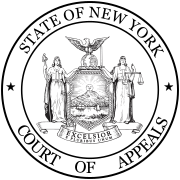| Lemmon v. New York | |
|---|---|
 | |
| Court | New York Court of Appeals |
| Decided | March 1860 |
| Citation | 20 N.Y. 562 (1860) |
| Court membership | |
| Judges sitting | George F. Comstock (chief), Henry E. Davies, Samuel Lee Selden, Hiram Denio, William B. Wright (acting), Thomas W. Clerke (acting), William J. Bacon (acting), Henry Welles (acting) |
| Case opinions | |
| Decision by | Denio, Wright |
| Concurrence | Davis, Bacon, Welles |
| Dissent | Clerke, Comstock |
| Keywords | |
Lemmon v. New York, or Lemmon v. The People (1860),[1] popularly known as the Lemmon Slave Case, was a freedom suit initiated in 1852 by a petition for a writ of habeas corpus. The petition was granted by the Superior Court in New York City, a decision upheld by the New York Court of Appeals, New York's highest court, in 1860 on the eve of the Civil War.[2][3]
The decision mandated the release of eight slaves, including six children, brought into New York by their Virginia slave owners, Jonathan and Juliet Lemmon,[4] who were in transit while relocating to Texas.[5] New York had abolished slavery gradually beginning in 1799, freeing all remaining slaves on July 4, 1827. An 1841 state law explicitly prohibited slaveholders from bringing slaves in transit to the state, liberating any slaves so brought.[6]
Attorney John Jay (1817–1894) represented the state in the 1852 case. Future President Chester A. Arthur represented the state on appeal by the former slaveowners. Counsel to him were William M. Evarts, Joseph Blunt, and Erastus D. Culver.
- ^ Don E. Fehrenbacher (1978), The Dred Scott Case: Its Significance in American Law and Politics, 2001 reprint, New York: Oxford, Part 1, "Out of the Past", Ch. 3, "The Pursuit of Freedom", p. 60, ISBN 978-0195145885
- ^ 20 N.Y. 562 (1860)
- ^ Gordan 2006, pp. 1, 8–12.
- ^ Finkelman, Paul (1981). An Imperfect Union: Slavery, Federalism, and Comity (Reprint 2000 ed.). Chapel Hill: University of North Carolina Press. p. 4. ISBN 978-1584770923.
- ^ Heidler, David Stephen; Heidler, Jeanne T.; Coles, David J. (2002). Encyclopedia of the American Civil War: a political, social, and military. W.W. Norton & Co. p. 1174. ISBN 978-0393047585.
- ^ Finkelman, Paul (1981). An Imperfect Union: Slavery, Federalism, and Comity (Reprint 2000 ed.). Chapel Hill: University of North Carolina Press. p. 131. ISBN 978-1584770923.